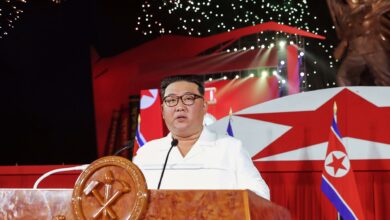Rio de Janeiro cancels Carnival street parades, limiting them to Sambadrome

Rio de Janeiro, Jan 4 (EFE).- The Rio de Janeiro Carnival celebration, for the second consecutive year, will not include “street” parades and parties, as the big processions and gatherings featuring dancing and music are known, with city authorities on Tuesday once again announcing the suspension of the events due to the Covid-19 pandemic.
Although the street parades are considered to be “the soul” of Brazil’s biggest festival, the more than 500 “blocks,” as the bands and dance groups that wend their ways through the city streets during the event are called, once again will not be contributing their liveliness and joy to this year’s celebration.
So far, only the huge parades of the samba schools have been confirmed, all of which will be held in the Sambadrome with only paying customers being allowed to attend.
The announcement was made by Rio Mayor Eduardo Paes after a meeting on Tuesday lasting a little over an hour with representatives of the “blocks” in Rio and in which municipal health secretary Daniel Soranz also participated.
“The street Carnival, in the way in which it was held up until 2020, will not occur in 2022,” said the mayor in a live transmission on the social networks.
“The street Carnival, because of its very nature and due to the democratic aspect it has, makes it impossible to control in any way,” he said.
The same restriction will not apply to the samba schools’ colorful and lively dance and music parades in the Sambodrome, which according to the mayor at this point will still be held, because at that enclosed venue it is possible to implement “a series of controls,” such as those performed when people enter a stadium to see a soccer match, although he did not specify what kind of controls those would be or how they would be undertaken.
The cancellation of the street Carnival was accepted by the blocks, who had previously agreed to abide by the decision made by City Hall in the matter.
Paes said that his health secretariat had already warned him about the difficulty of holding the street parades in Rio due to the sharp rise in the number of Covid-19 cases, apparently many if not most of them being caused by the new and highly transmissible Omicron variant of the coronavirus.
The positive Covid testing rate has increased from 1 percent in mid-December to 13 percent during the past week in Rio, according to official figures.
Nevertheless, the number of hospitalizations at public health facilities remains at one of the lowest levels since the start of the pandemic, although the number of Covid patients occupying hospital beds has risen from 11 at Christmas to 24 on Tuesday.
The Health Secretariat expects that, although infections have increased in the city, the vaccination program is preventing there from being an “elevated” number of hospitalizations and/or deaths from the virus.
Vaccination is not designed to prevent infection, but rather to lessen the seriousness of the symptoms, and thus lessen the hospitalization and death rates, for those who do become infected.
Health authorities also said that the flu epidemic that the city was experiencing has been halted and that simultaneous cases of Covid and the flu – now being called “flurona” – are isolated and without epidemiological significance.
Given the impossibility of holding the street Carnival celebrations in Rio, Paes said that he proposed an alternative so that those parades could still be held in some form but it was not accepted by the representatives of the blocks.
In addition to Rio, Salvador – the capital of the northeastern state of Bahia – also canceled its street Carnival celebrations on Tuesday, but authorities in other cities where well-known and heavily attended street festivities are held, including Sao Paulo and Recife, have not yet decided whether to allow them to proceed.
EFE mat/wgm/eat/bp





